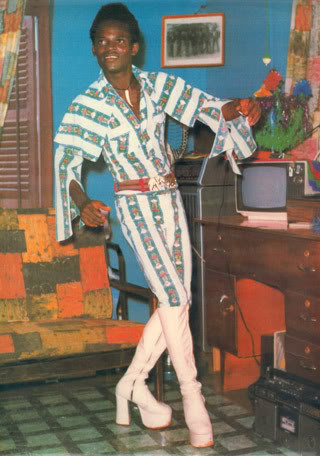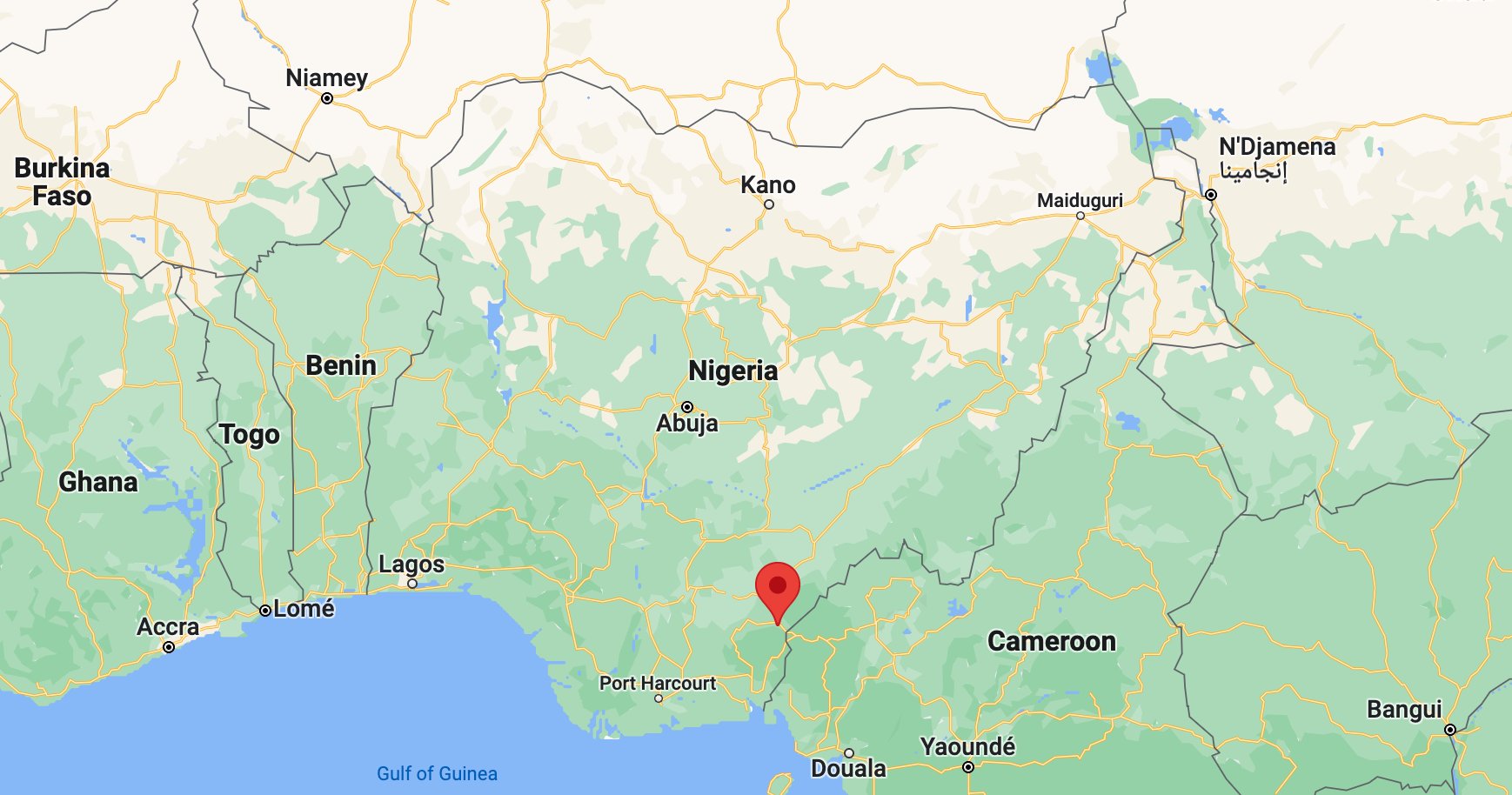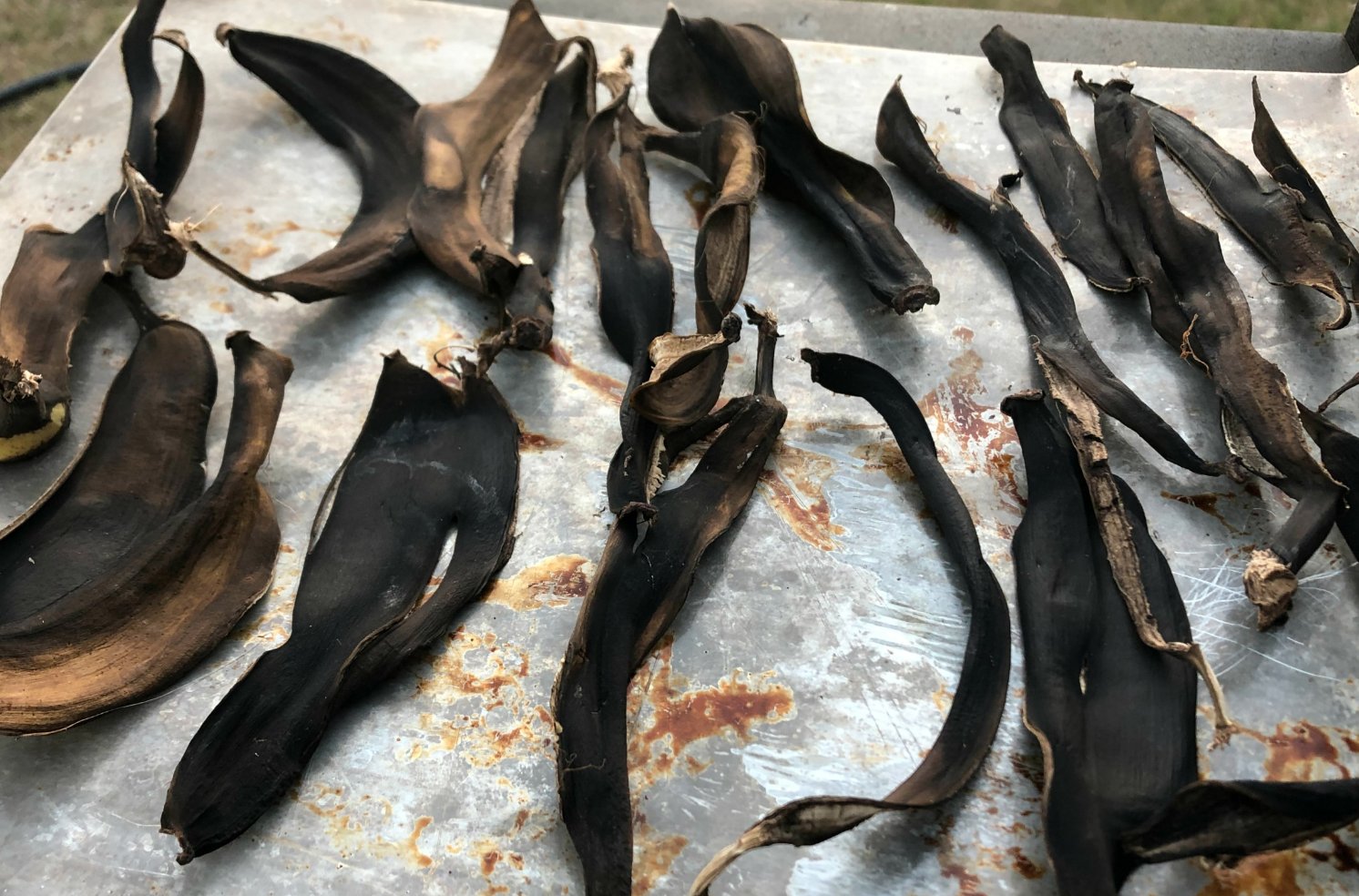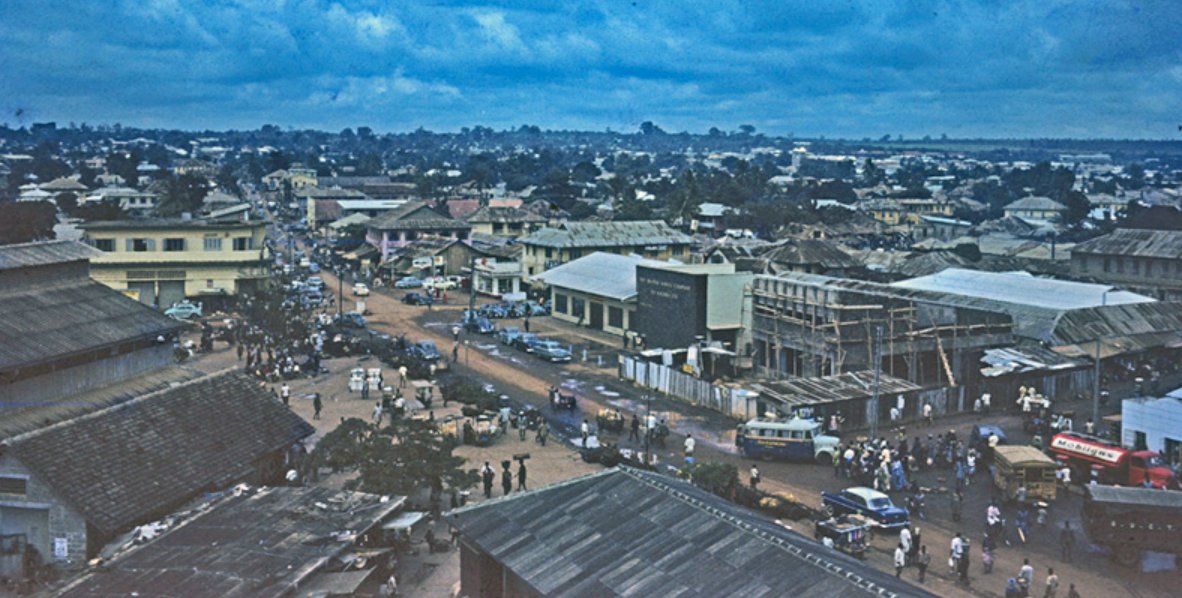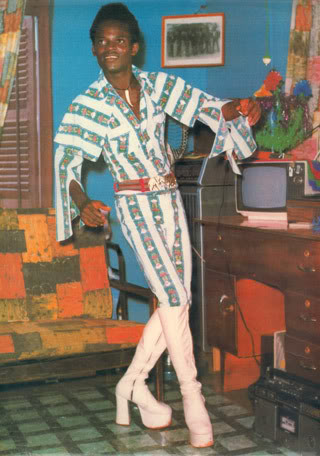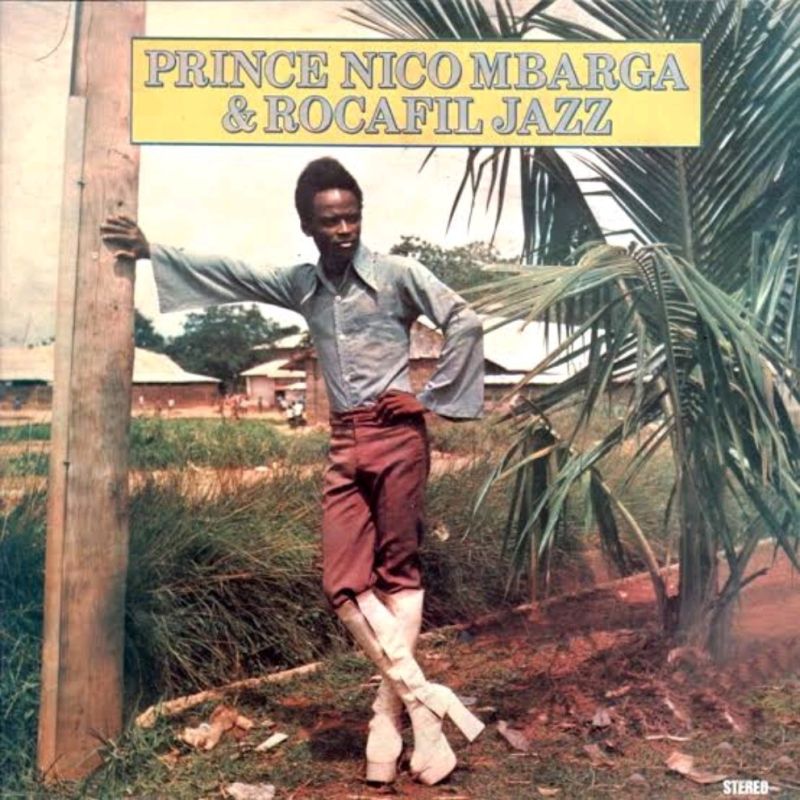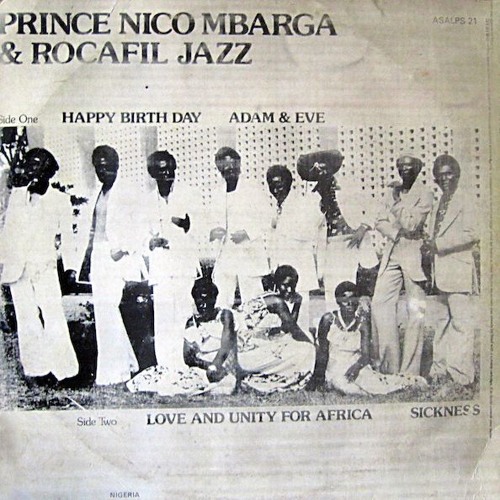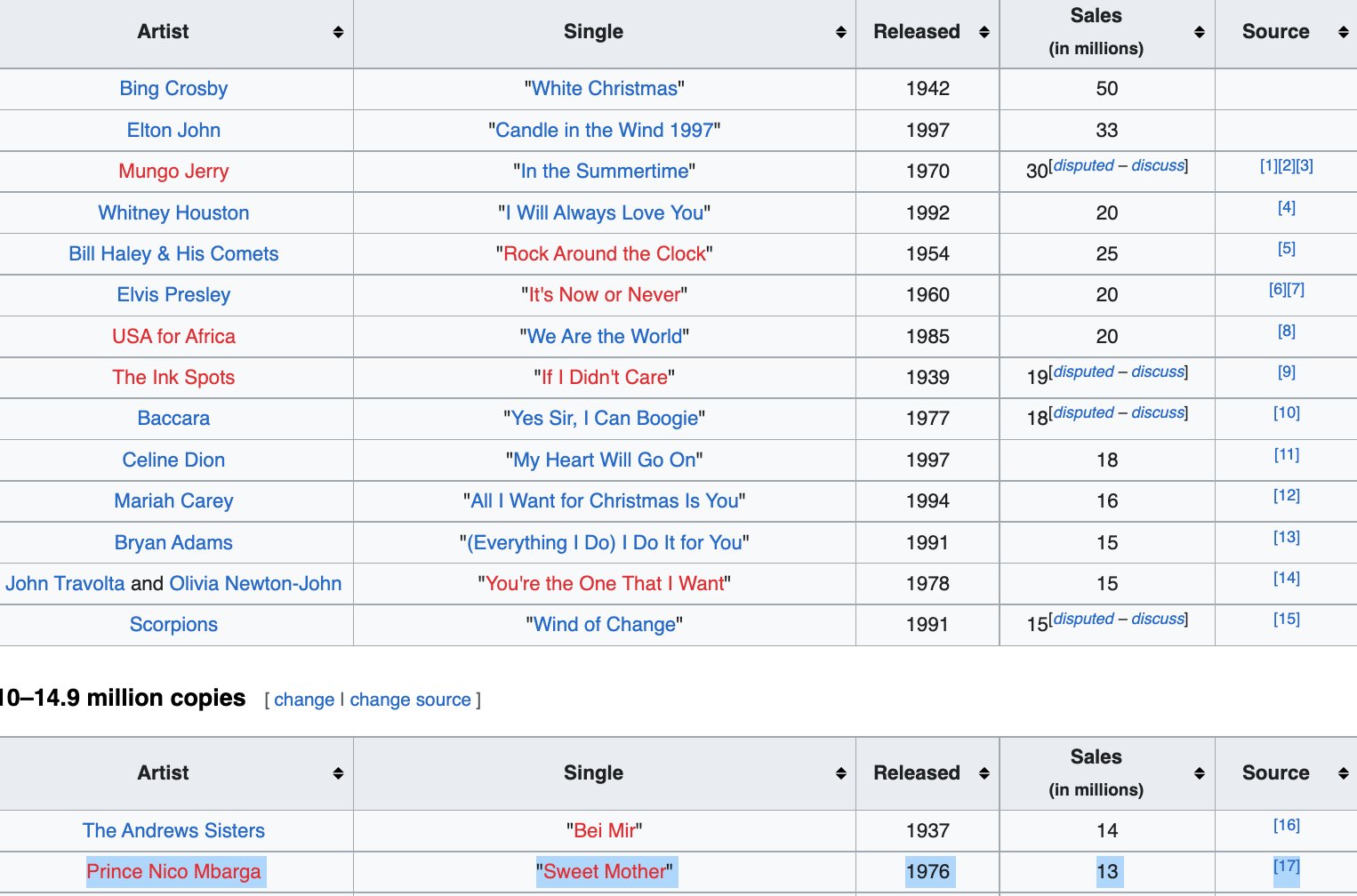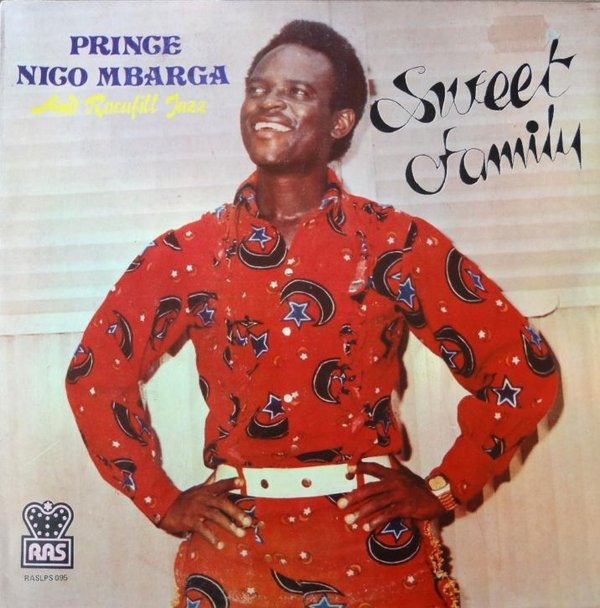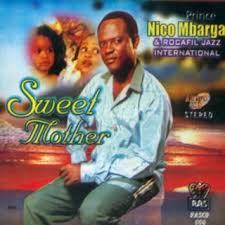Thread
Prince Nico Mbarga’s “Sweet Mother” has sold more copies than “Macarena.”
And even The Beatles’ “I Want to Hold Your Hand”.
But chances are, especially if you’re not Nigerian, you’ve never heard of him.
Until now.
His rollercoaster-of-a-life story:
And even The Beatles’ “I Want to Hold Your Hand”.
But chances are, especially if you’re not Nigerian, you’ve never heard of him.
Until now.
His rollercoaster-of-a-life story:
Before we start, I’d like to thank Sami Kent who traveled through Nigeria and Cameroon to collect first hand testimony to tell this story for Narratively…
A story that starts in the 1950s…
In a small Nigerian bordertown called Ikom (back then a British colony).
A story that starts in the 1950s…
In a small Nigerian bordertown called Ikom (back then a British colony).
Ikom in the 1950s is remote.
And I mean remote.
Certainly nothing finds its way there by car. There are no roads, after all.
And I mean remote.
Certainly nothing finds its way there by car. There are no roads, after all.
And by sea?
Well, every once and a while a barge full of merchants crawling up the Cross River makes a pit stop in Ikom, offloading trunks of discounted, not-yet-sold bicycles and sewing machines to excited residents.
Well, every once and a while a barge full of merchants crawling up the Cross River makes a pit stop in Ikom, offloading trunks of discounted, not-yet-sold bicycles and sewing machines to excited residents.
But a young Nico Mbarga, who lives in Ikom?
He finds things to do aplenty in his isolated village.
He spends his days on the Cross River fishing for tilapia, followed by setting bird traps in the shade of nearby forests - a momentary reprieve from the boiling West African sun.
He finds things to do aplenty in his isolated village.
He spends his days on the Cross River fishing for tilapia, followed by setting bird traps in the shade of nearby forests - a momentary reprieve from the boiling West African sun.
Normally, Nico passes his time in silence, save for banter with his best friend Ojong in between casts from the Cross River shore.
Until, that is, Nico’s father gives him a gift.
A gift, little does Nico know, that will change his life.
Forever.
Until, that is, Nico’s father gives him a gift.
A gift, little does Nico know, that will change his life.
Forever.
It’s a secondhand Phillips radio, bought with pennies his father saved sawing timber for a living.
And before Nico and his family know it, it’s silence no more –
Music roars from Nico’s radio’s singular speaker, plugged in what seems like…
All the damn time.
And before Nico and his family know it, it’s silence no more –
Music roars from Nico’s radio’s singular speaker, plugged in what seems like…
All the damn time.
Nico’s poison?
Highlife music –
A West African / Western Jazz fusion that was born decades prior in present-day Ghana when the region was occupied by the British.
And this highlife music?
It’s fire.
Here’s one of Nico’s favorites, Bobby Benson’s “Taxi Driver”:
Highlife music –
A West African / Western Jazz fusion that was born decades prior in present-day Ghana when the region was occupied by the British.
And this highlife music?
It’s fire.
Here’s one of Nico’s favorites, Bobby Benson’s “Taxi Driver”:
Soon enough, Nico’s not just listening to this stuff.
He’s playing it, too.
He glues together a few dried out plantain skins and pieces of bark and before he knows it, he’s got himself a homemade xylophone.
“It was completely something that he innovated,” Ojong remembers.
He’s playing it, too.
He glues together a few dried out plantain skins and pieces of bark and before he knows it, he’s got himself a homemade xylophone.
“It was completely something that he innovated,” Ojong remembers.
But then, soon after highlife music brings vibrant light into Nico’s life…
Things get dark.
His father dies of a sudden illness.
Nico’s mother, a peasant farmer, now has to support four children.
Alone.
Things get dark.
His father dies of a sudden illness.
Nico’s mother, a peasant farmer, now has to support four children.
Alone.
With a shovel in one hand and a child in the other, Nico’s mother ensures her kids have food on the table and love at home.
It’s a sacrifice Nico doesn’t take lightly and as he gets older, he wants one thing and one thing only:
To help his mother in crisis.
Or at least try.
It’s a sacrifice Nico doesn’t take lightly and as he gets older, he wants one thing and one thing only:
To help his mother in crisis.
Or at least try.
Nico packs his xylophone.
And starts knocking on doors.
Village to village.
Asking bar owners if he can play sets there for a small wage.
A few oblige.
And although they don’t pay well - like, at all - one thing’s for certain:
Nico is getting good.
Real good.
And starts knocking on doors.
Village to village.
Asking bar owners if he can play sets there for a small wage.
A few oblige.
And although they don’t pay well - like, at all - one thing’s for certain:
Nico is getting good.
Real good.
Soon after though, when Nico is only 17, the Nigerian Civil War (or Biafran War) breaks out.
While many in Ikom and other parts of eastern Nigeria flee for the likes of Cameroon, Nico’s family stays put.
But not Nico.
He gets a move on.
After all…
He’s got songs to play.
While many in Ikom and other parts of eastern Nigeria flee for the likes of Cameroon, Nico’s family stays put.
But not Nico.
He gets a move on.
After all…
He’s got songs to play.
With a xylophone and a dream, Nico finds himself in Mamfe, Cameroon – close to the border of his now war torn homeland long lost.
It’s there he meets Lucy.
And soon, they'll share a modern-day, West-African-Romeo-&-Juliet sort of tale - a tale not even Shakespeare could scribe.
It’s there he meets Lucy.
And soon, they'll share a modern-day, West-African-Romeo-&-Juliet sort of tale - a tale not even Shakespeare could scribe.
“As I first see him, I love him,” Lucy says.
But for Lucy's mother?
It's a different story.
“Even my mother did no gree," Lucy remembers.
"She said, ‘He’s a small boy, he don’t have money!’
But I said, ‘No… that boy is my choice.’”
But for Lucy's mother?
It's a different story.
“Even my mother did no gree," Lucy remembers.
"She said, ‘He’s a small boy, he don’t have money!’
But I said, ‘No… that boy is my choice.’”
Lucy’s choice - absolutely.
The two can’t afford a pot to boil water, but they wed anyway, with Lucy at home looking after their two eventual kids and Nico a “band boy” for a Congolese cover band, schlepping their instruments from town to town.
But soon…
This will all change.
The two can’t afford a pot to boil water, but they wed anyway, with Lucy at home looking after their two eventual kids and Nico a “band boy” for a Congolese cover band, schlepping their instruments from town to town.
But soon…
This will all change.
It’s 1970.
The Biafran War comes to an end, and Nico and Lucy - without a penny to their names, or passports - traverse “the bush way” to make it back to Nigeria, settling in Onitsha, a trading down on the Niger River.
And oh what a town Onitsha would be for them…
The Biafran War comes to an end, and Nico and Lucy - without a penny to their names, or passports - traverse “the bush way” to make it back to Nigeria, settling in Onitsha, a trading down on the Niger River.
And oh what a town Onitsha would be for them…
Onitsha is booming.
Literally.
There’s a post-war euphoria amongst Onitsha residents, and newfound petrol in the country has the economy spurring – and soon, too…
Nico.
Because Nico...
In Onitsha?
It's there that "God blessed him,” Lucy says.
Literally.
There’s a post-war euphoria amongst Onitsha residents, and newfound petrol in the country has the economy spurring – and soon, too…
Nico.
Because Nico...
In Onitsha?
It's there that "God blessed him,” Lucy says.
Blessed indeed, it seems.
Nico catches fire.
He and his new group, “Rocafil Jazz” play the Sunday night gig every week at Onitsha’s Plaza Hotel and by 1973, Nico is signed by record company EMI, where he releases his new highlife-inspired single:
“I No Go Marry My Papa”
Nico catches fire.
He and his new group, “Rocafil Jazz” play the Sunday night gig every week at Onitsha’s Plaza Hotel and by 1973, Nico is signed by record company EMI, where he releases his new highlife-inspired single:
“I No Go Marry My Papa”
The song is about a woman who disagrees with her parents about the choice of her husband…
But marries him anyway.
Any guesses as to what inspired Nico to write this one?
But marries him anyway.
Any guesses as to what inspired Nico to write this one?
From there, Nico’s got some swagger.
He’s building his brand and records another track in 1974 called “Sweet Mother.”
The song starts, seemingly, from a memory:
“Sweet Mother, I no go forget you, for dey suffer wey you suffer for me…”
Any idea where this one comes from?
He’s building his brand and records another track in 1974 called “Sweet Mother.”
The song starts, seemingly, from a memory:
“Sweet Mother, I no go forget you, for dey suffer wey you suffer for me…”
Any idea where this one comes from?
“When I dey hungry my mother go run up and down /
she dey find me something when I go chop oh! /
Sweet Mother a-aah /
Sweet Mother oh-e-oh!”
An EMI exec named Odion Iruoje is the first to hear it and can’t believe his ears.
“It was the magic,” he says, as soon as he listens.
she dey find me something when I go chop oh! /
Sweet Mother a-aah /
Sweet Mother oh-e-oh!”
An EMI exec named Odion Iruoje is the first to hear it and can’t believe his ears.
“It was the magic,” he says, as soon as he listens.
The issue is, when Nico plans to record “Sweet Mother” at the EMI studio, Iruoje, seen here, has to skip town to produce a track for some English group called “The Beatles.”
The EMI folks who hear “Sweet Mother” in lieu of Iruoje, however, ain't impressed.
It’s “too childish."
The EMI folks who hear “Sweet Mother” in lieu of Iruoje, however, ain't impressed.
It’s “too childish."
So, “Sweet Mother” goes unproduced.
Instead of being another hit single like “I No Go Marry My Papa”, “Sweet Mother” is played in front of small crowds throughout Nigeria.
Until, of course, a Rogers All Stars, hears it.
Instead of being another hit single like “I No Go Marry My Papa”, “Sweet Mother” is played in front of small crowds throughout Nigeria.
Until, of course, a Rogers All Stars, hears it.
It’s unclear if All Stars (what a name, man) is in the crowd on a quiet night at the Plaza Hotel scouting talent or enjoying an evening on the town, but as soon as he hears Nico belt out “Sweet Mother,” All Stars reminisces:
“I could see he was a star.”
“I could see he was a star.”
Nico - now Prince Nico - and All Stars get to work.
For months on end, they - including Nico’s entire Rocafil group - rehearse the song at the crack of dawn, putting Nico up front, finger picking his guitar in the Congolese style he adapted in his years as a mere “band boy.”
For months on end, they - including Nico’s entire Rocafil group - rehearse the song at the crack of dawn, putting Nico up front, finger picking his guitar in the Congolese style he adapted in his years as a mere “band boy.”
After months of practice, the final version is released in 1976 from a Lagos studio.
And the song is, as the cool kids would say...
Straight bars.
It’s the type of track that gets Nigerians near and far on their feet, belting “Sweet Mother oh-e-oh!” at the top of their lungs.
And the song is, as the cool kids would say...
Straight bars.
It’s the type of track that gets Nigerians near and far on their feet, belting “Sweet Mother oh-e-oh!” at the top of their lungs.
And in a postwar Nigeria, where it’s everything but consensus when it comes to politics, one thing is for sure:
EVERYONE…and I mean EVERYONE…
Loves the hell out of “Sweet Mother.”
“It was like a national anthem,” Jean Duclair, the Rocafil guitarist says.
EVERYONE…and I mean EVERYONE…
Loves the hell out of “Sweet Mother.”
“It was like a national anthem,” Jean Duclair, the Rocafil guitarist says.
Now, Rocafil Jazz isn't just playing in bars.
They’re in Ghana.
Togo.
Kenya.
And Nico’s a star.
And each time he yells “Sweet mother, I no go forget you” to sold out crowds, it’s his mother on his mind.
Because without her, Nico knows he has none of this.
None of it at all
They’re in Ghana.
Togo.
Kenya.
And Nico’s a star.
And each time he yells “Sweet mother, I no go forget you” to sold out crowds, it’s his mother on his mind.
Because without her, Nico knows he has none of this.
None of it at all
But the fame…
And the money…
It all comes too fast for Rocafil Jazz.
After a frustrating tour in London, followed by plans to play in Japan, Rocafil folds.
Then re-forms.
Changes members.
Re-forms a second time.
Only to be broken up…
To never come back together again.
And the money…
It all comes too fast for Rocafil Jazz.
After a frustrating tour in London, followed by plans to play in Japan, Rocafil folds.
Then re-forms.
Changes members.
Re-forms a second time.
Only to be broken up…
To never come back together again.
But in Rocafil’s prime - and the years thereafter - “Sweet Mother” would go on to sell more than…get this:
13 million copies.
That’s 17th ALL TIME…and 10th since 1976.
However, as you may suspect…
You’d never know any of this if you spoke to one of the Rocafil guys today.
13 million copies.
That’s 17th ALL TIME…and 10th since 1976.
However, as you may suspect…
You’d never know any of this if you spoke to one of the Rocafil guys today.
Royalty payments that should have gone to Nico and Rocafil Jazz were limited given how many pirate recordings were made of the hit…
And as the economy on the continent in the 80s sputtered, shops selling records increased profits by slinging dubbed cassettes.
And as the economy on the continent in the 80s sputtered, shops selling records increased profits by slinging dubbed cassettes.
Today, Duclair - the lead guitarist of the 17th best selling song ever! - can’t raise a dime for new projects.
Even Rogers All Stars has seen better days.
“You can see,” he tells Sami Kent who recently visited him in his rundown Onitsha office…
“You can see how poor we are.”
Even Rogers All Stars has seen better days.
“You can see,” he tells Sami Kent who recently visited him in his rundown Onitsha office…
“You can see how poor we are.”
As for Nico?
He returns to Ikom in the late 1980s, back where he learned to fish tilapia and set bird traps…
He plays air guitar, beats on an invisible xylophone, and sings a highlife he himself reinvented at dinners home with his family, yearning for his heyday long past.
He returns to Ikom in the late 1980s, back where he learned to fish tilapia and set bird traps…
He plays air guitar, beats on an invisible xylophone, and sings a highlife he himself reinvented at dinners home with his family, yearning for his heyday long past.
Nico never comes out with a hit like “Sweet Mother” again and slowly disappears into anonymity in his quiet hometown of Ikom.
But in 1997, Nico - and the Rocafil boys - get the chance of a lifetime…
To get the band back together and play a 50-state tour in the US.
But in 1997, Nico - and the Rocafil boys - get the chance of a lifetime…
To get the band back together and play a 50-state tour in the US.
For Nico, a chance to scrap his air guitar for the real thing.
And to swap his only listeners these days - his family - for thousands of screaming fans.
A goodbye tour of sorts.
Nico can’t contain himself.
He hops in his car to collect his visa required for travel to the US.
And to swap his only listeners these days - his family - for thousands of screaming fans.
A goodbye tour of sorts.
Nico can’t contain himself.
He hops in his car to collect his visa required for travel to the US.
On the way there, Nico’s car runs out of petrol.
So he hails down an okada: a local motortaxi.
But an accident sends Nico flying.
He hits his head.
Badly.
Nico dies two weeks later in the hospital.
Never able to play “Sweet Mother” one last time.
Or say goodbye.
So he hails down an okada: a local motortaxi.
But an accident sends Nico flying.
He hits his head.
Badly.
Nico dies two weeks later in the hospital.
Never able to play “Sweet Mother” one last time.
Or say goodbye.
Back in Ikom, when Nico’s mother - now elderly - hears the news, she falls in shock.
She’d never get back up, either.
She dies shortly after.
She’d never get back up, either.
She dies shortly after.
And we can only hope, just as Nico would have wanted it…
That his mother had “Sweet Mother” playing on that secondhand Phillips radio right beside her on her deathbed…
Hearing her son sing one last time:
“Sweet mother, I no go forget you…
Sweet mother, I no go forget you.”
That his mother had “Sweet Mother” playing on that secondhand Phillips radio right beside her on her deathbed…
Hearing her son sing one last time:
“Sweet mother, I no go forget you…
Sweet mother, I no go forget you.”
Like this story?
Follow me @DavidZabinsky.
I’ll be telling stories like Prince Nico’s - ones you’ve likely never heard before! - every week.
Follow me @DavidZabinsky.
I’ll be telling stories like Prince Nico’s - ones you’ve likely never heard before! - every week.
This story was originally told in an article written by @SamiKent and published by my friends at Narratively.
You can read the piece here:
narratively.com/his-biggest-hit-sold-more-copies-than-any-of-the-beatles-so-why-havent-you-heard-of-h...
You can read the piece here:
narratively.com/his-biggest-hit-sold-more-copies-than-any-of-the-beatles-so-why-havent-you-heard-of-h...
And be sure to follow @Narratively for more ‘hidden history’ stories just like this one.
So this is pretty awesome.
THE Nico Mbarga Jr (@MbargaNicol) got in touch and shared this rendition he and his brother Phils made of "Sweet Mother" a year ago.
Needless to say, Dad would be proud...
(And let's show these guys some love!)
www.youtube.com/watch?app=desktop&v=s0zR53j-ZLY
THE Nico Mbarga Jr (@MbargaNicol) got in touch and shared this rendition he and his brother Phils made of "Sweet Mother" a year ago.
Needless to say, Dad would be proud...
(And let's show these guys some love!)
www.youtube.com/watch?app=desktop&v=s0zR53j-ZLY
Mentions
See All
Blake Burge @blakeaburge
·
Mar 31, 2023
Amazing story, wonderfully told.
